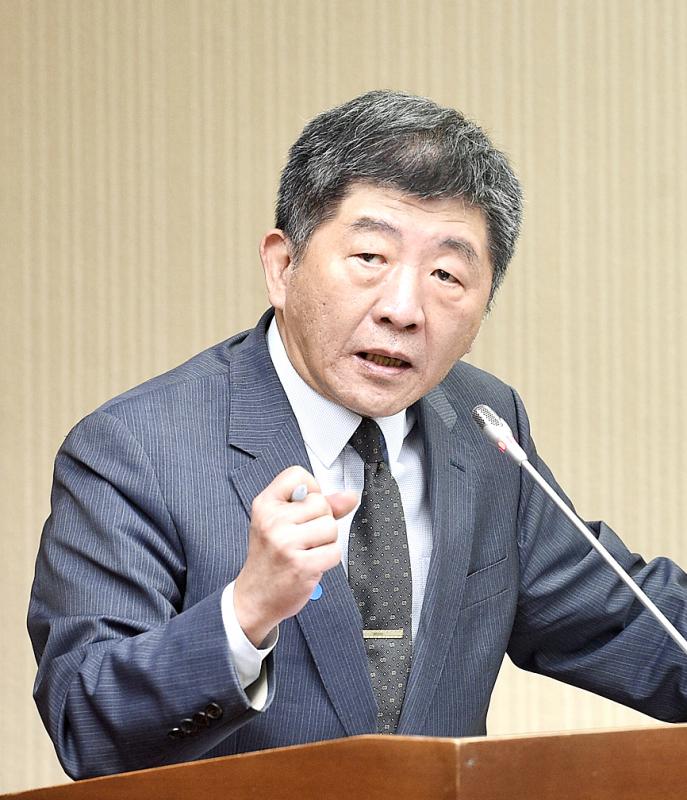The nation’s COVID-19 vaccination program has proceeded a little slower than expected, so the Central Epidemic Command Center (CECC) is considering expanding the program to include more priority groups, Minister of Health and Welfare Chen Shih-chung (陳時中) said at a meeting of the Social Welfare and Environmental Hygiene Committee at the legislature in Taipei yesterday.
At present, vaccines are being offered to frontline healthcare workers at hospitals dealing with COVID-19 cases, but as of Sunday only 9,377 jabs had been administered.
As the first batch of about 117,000 doses of the AstraZeneca vaccine has an expiration date of June 15, legislators expressed concern that they would not be used in time.

Photo: Peter Lo, Taipei Times
The number of vaccines administered in the first week was lower than the center had expected, Chen said, adding that the reason was likely because of media reports of adverse side effects overseas that have dented people’s confidence in the AstraZeneca vaccine.
“We allow people to freely choose if they want to get vaccinated and we arranged a priority list for the rollout so that people in higher-priority groups could get the vaccine first, but if their willingness to get vaccinated is low we could gradually offer the vaccine to lower-priority groups,” Chen said.
The center would discuss the issue and likely make an announcement tomorrow, he said.
Chen was asked whether the center had made any progress in its discussions with BioNTech in the past month after the minister last month said in an interview that Taiwan was close to securing a deal to purchase 5 million doses of the Pfizer-BioNTech vaccine last year, but the deal fell through at the last minute, possibly due to “intervention from outside forces.”
After the interview was published, Reuters reported that BioNTech said that the company was still planning to provide vaccines to Taiwan and that discussions were ongoing.
The center had asked the Ministry of Foreign Affairs to clarify the situation, Chen said, and the company had said that it might have to postpone providing the vaccine to Taiwan by several weeks or months due to supply-chain issues. Taiwan would likely have received other vaccines or domestically produced vaccines by that time, so the possibility of signing a contract with BioNTech has receded, he said.
Separately, Centers for Disease Control Deputy Director-General Chuang Jen-hsiang (莊人祥), who is also CECC spokesman, said the next priority group for vaccination would likely be “non-healthcare workers” at hospitals dealing with COVID-19 cases, as well as “healthcare workers at other facilities,” but that a decision would be made at a CECC specialists’ meeting.
Those who were vaccinated last week would need to receive a second dose in late May at the earliest, Chuang said, adding that the center is negotiating with AstraZeneca and COVAX to secure another shipment and that he was confident it would arrive in time.
Meanwhile, the center yesterday reported one new imported COVID-19 case, a Taiwanese who had returned from the Philippines.
Additional reporting by CNA

MAKING WAVES: China’s maritime militia could become a nontraditional threat in war, clogging up shipping lanes to prevent US or Japanese intervention, a report said About 1,900 Chinese ships flying flags of convenience and fishing vessels that participated in China’s military exercises around Taiwan last month and in January last year have been listed for monitoring, Coast Guard Administration (CGA) Deputy Director-General Hsieh Ching-chin (謝慶欽) said yesterday. Following amendments to the Commercial Port Act (商港法) and the Law of Ships (船舶法) last month, the CGA can designate possible berthing areas or deny ports of call for vessels suspected of loitering around areas where undersea cables can be accessed, Oceans Affairs Council Minister Kuan Bi-ling (管碧玲) said. The list of suspected ships, originally 300, had risen to about

DAREDEVIL: Honnold said it had always been a dream of his to climb Taipei 101, while a Netflix producer said the skyscraper was ‘a real icon of this country’ US climber Alex Honnold yesterday took on Taiwan’s tallest building, becoming the first person to scale Taipei 101 without a rope, harness or safety net. Hundreds of spectators gathered at the base of the 101-story skyscraper to watch Honnold, 40, embark on his daredevil feat, which was also broadcast live on Netflix. Dressed in a red T-shirt and yellow custom-made climbing shoes, Honnold swiftly moved up the southeast face of the glass and steel building. At one point, he stepped onto a platform midway up to wave down at fans and onlookers who were taking photos. People watching from inside

Japan’s strategic alliance with the US would collapse if Tokyo were to turn away from a conflict in Taiwan, Japanese Prime Minister Sanae Takaichi said yesterday, but distanced herself from previous comments that suggested a possible military response in such an event. Takaichi expressed her latest views on a nationally broadcast TV program late on Monday, where an opposition party leader criticized her for igniting tensions with China with the earlier remarks. Ties between Japan and China have sunk to the worst level in years after Takaichi said in November that a hypothetical Chinese attack on Taiwan could bring about a Japanese

The WHO ignored early COVID-19 warnings from Taiwan, US Deputy Secretary of Health and Human Services Jim O’Neill said on Friday, as part of justification for Washington withdrawing from the global health body. US Secretary of State Marco Rubio on Thursday said that the US was pulling out of the UN agency, as it failed to fulfill its responsibilities during the COVID-19 pandemic. The WHO “ignored early COVID warnings from Taiwan in 2019 by pretending Taiwan did not exist, O’Neill wrote on X on Friday, Taiwan time. “It ignored rigorous science and promoted lockdowns.” The US will “continue international coordination on infectious